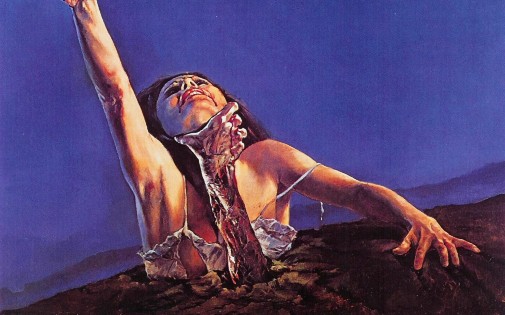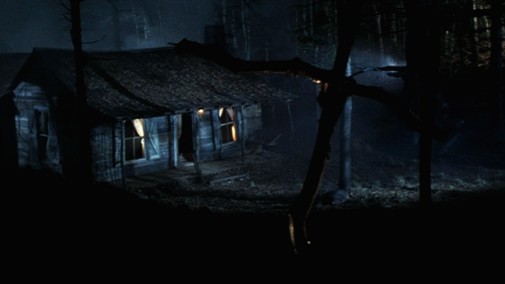Evil Dead: The Original Trilogy Revisited
 Thursday, April 27, 2023 at 12:00PM
Thursday, April 27, 2023 at 12:00PM 
As tentpoles falter and prestige fare fails to perform, horror continues to prove a safe investment for Hollywood. You won't find me complaining about that last bit, for scary movies have long won my affection. And yet, while celebrating box office success, it's distasteful to meander in mercenary matters. Instead, let's consider a new sensation in Evil Dead Rises, the fifth film in the horror franchise Sam Raimi birthed at the dawn of the 80s. Indeed, while these deadite-infested movies have strayed away from detailing the adventures of Ash Williams – check out the TV series Ash vs. Evil Dead for more of that – the original trilogy continues to have a special place in fans' hearts.
So, join me as I revisit Raimi's first ventures into gory horror, horror comedy, and medieval fantasia…

The story of The Evil Dead's making is almost as famous as the movie itself, accruing the spooky portent of a story shared in hushed tones over a campfire. It all started in childhood when young Sam Raimi and Bruce Campbell became friends bound by their love of moviemaking. With a trusty Super 8 camera, they shot a number of amateur productions, their imaginations sparked by the horror flicks they consumed like avid cinephiles. And so, after devising many a comedic scenario, the two collaborated on a short film that would work as proof of concept for a future feature.
That prototype was titled Within the Woods, costing around 1600 dollars. Raimi was 19, and Campbell 20, making their search for funding rather tricky, an issue further complicated by how their short didn't impress most potential investors. Still, at the end of the day, they scrapped enough resources to go ahead with the project, a cinematic rite of passage full of Lovecraftian indulgences. The entire process was a pain, full of problems stemming from the filmmakers' inexperience and grand ambition, micro-budget, and general recklessness.
Accidents were common on set, and so was a sense of directorial improvisation and not a little sadistic glee from an artist who believed making the cast suffer was part of the magic. Getting the film sold was another challenge, with a stunt-filled premiere and a desperate gambit for exposure at Cannes courtesy of producer Irvin Shapiro. At the Croisette, Stephen King played an essential part, becoming one of its vocal supporters. The king of modern horror literature declared it "the most ferocious original film of the year."

Eventually, the good press by such media apparatus as Fangoria motivated distributors to acquire Raimi's feature debut, with New Line Cinema securing domestic rights. Though ticket sales were initially low, The Evil Dead became a sleeper hit, its infamy further augmented by its presence in the UK's video nasties list of restricted titles. Setting aside all that, to regard 1981's The Evil Dead is to stare straight into a black pit of gross imagination unbound by matters of taste or aesthetic moderation. The movie fully earns its cult status by formalistic means alone, the camera's expressivity a central component of its horror.
Rudimentary special effects and grotesque makeup galore represent another delight. Sure, they are crudely accomplished but viscerally felt, especially in the infamous, disturbing, mayhap unnecessary tree rape. Considering the exuberant style, one grasps that it's not a visualization of the story as much as the content itself, the raison d'être behind it all. Truthfully, characters and tale are secondary to the cascade of horrifying attacks as a group of college-aged friends despair alone in a cabin at the mercy of the Necronomicon-invoked forces of the beyond.
Bruce Campbell's Ash isn't so much the protagonist as the last remaining target, surviving long enough to be tortured by the reanimated bodies of his loved ones. The result is a movie that works like a carnival of assorted phantasmagoria, untethered from tridimensional writing in a way that feels purposeful. Moreover, it's the only of Raimi's Evil Deads interested in being plain scary. Here, he achieves a grueling intensity that's genuinely creepy to witness as it moves through you at the speed of light. That nasty nightmare kickstarted Sam Raimi and Bruce Campbell's Hollywood careers, and by the mid-80s, they were ready to return to its horrors.

Only this time, the director was even less interested in classical storytelling, preferring to conceive a basic skeleton on which to pile a plethora of absurdities, all created with a cinematic verve that boggles the mind. First, 1987's Evil Dead II isn't so much a straight sequel as a revisit of the other movie's ideas, virtually remaking it with a new tonal bend. This time, instead of straight-faced horror, it's black-hearted comedy verging on Looney Tunes-like farce. It may be the best horror comedy in film history, the platonic ideal, getting there by committing to its wild swerves while preserving the fundamental mechanics where funny business and fear overlap.
A laugh and a scream aren't that different, originating in primal responses to disruption. They come from the gut, if you want to talk in terms as unpretentious as the movie itself. Still, there's sophistication to these efforts. For example, the filmmaking concretizing such gestures is so technically perfect it'll make you want to stand up and applaud, from stop-motion animation to the reveal of Ash with a chainsaw in the place where his hand used to be. At the same time, Campbell is game for whatever abuse Raimi precipitates upon him.
Revisiting the movies, you grow increasingly aware of how important the lead actor is in balancing the genre precepts, mixing them up with wild abandon. He's the gateway into our enjoyment, telegraphing an open invitation to have as much fun as the behind-the-scenes folks seem to be having. That critical role within the lunacy would become even more apparent when Evil Dead abandoned all idea of horror to instead focus on denuded humor given a fantasy veneer. Regardless of the version you watch – director's cut or theatrical version – 1992's Army of Darkness is simultaneously a departure and an organic continuation of its predecessors.

The archetypical cabin in the woods is left after another recap-remake, Ash's girlfriend recast for the second time in a devilish acknowledgment that continuity matters less than fun in this cinematic universe. After getting that out of the way, we're in Medieval Europe, with our final boy transported there by the Necronomicon at the end of Evil Dead II. Despite this wrinkle in the model, the basic narrative shape remains designed for simplicity. Ash is introduced to a reality foreign to him and quickly asserts his power as a time traveler from the future.
He must retrieve the damned book at the root of all his troubles to return home. In other words, the reluctant hero goes on a classic fetch quest. But of course, since this is a comedy increasingly dependent on Campbell's character work, the man's brash cockiness becomes dangerous arrogance. A pronunciation mistake when getting the artifact unleashes the army of the dead, leading to an action climax where Raimi shows off every VFX trick he learned since making the first Evil Dead. It's deliriously entertaining, refusing to take anything seriously, moving as swiftly as its sibling movies - I'm not counting the 2013 dead-serious remake, of course.
Reborn as an action hero and villain in tandem, Ash blossoms into his final form, and so does the movie achieve peak chaos. Having the highest budget of the three helps greatly, the formal plasticity and practical effects bacchanalia taken to new places heretofore unexplored by Raimi. That doesn't mean the production was easy, mind you, though it's hard to grieve about it when what ended up on screen is so damn lovable. The theatrical ending is the cherry on top, the perfect send-off to a one-of-a-kind original trilogy that celebrates everything that makes genre cinema so unique, so precious, so fucking exhilarating. If Evil Dead Rise captures even the tiniest fraction of this magic, it's a must-watch.

The Evil Dead can be found streaming on AMC+, while Evil Dead II is on IndieFlix. Those two and Army of Darkness can be rented or purchased from most major platforms.



Reader Comments (5)
Maybe TFE can consider a healthy vacation from articles focusing on films that feature violence against women. The recent spate of writings about flicks where woman are dismembered or slaughtered with an oversized drill or slashed for having a healthy sexual appetite feel excessive.
I can only speak from what I enjoy about this Website. However, these pieces are not generating double digits in the comment section. Those more popular responses go to writing that celebrate talented actresses or reflect on thoughtful discussions about older “classic” films. I think reflection by leadership is warranted.
Finbar McBride -- I can only assume you're referring to my journey through the Erotic Thrillers program on the Criterion Channel. It's only been three pieces about seven movies thus far, and I've written plenty of other stuff this month, including a celebration of Michelle Yeoh. Not to be obtuse, but you can just not read the pieces about genre stuff you find offensive.
I guess you'll be happy to know I'm working on a LETTER FROM AN UNKNOWN WOMAN piece for tomorrow, though I must confess this comment makes me sad and rankles the contrarian brat inside me. An article I was excited about posting now feels like a sour apology for a perceived transgression.
Still, if Nathaniel agrees with you, I will abandon the Erotic Thrillers project, and that'll be that. In any case, thank you for your feedback and for continuing to read even though you don't appreciate my latest writings. Hopefully, you'll stay around and continue to find other content on TFE that's more agreeable.
Cláudio Alves — Actually, we have disagreed numerous times on the issue of violence against women in film. For me, it was most memorable while debating the merits (or lack thereof) in the Independent Spirit nominee Pleasure.
I have also written numerous comments praising your insights and talents when writing on other topics. Hopefully that calms your inner contrarian brat.
We simply have very different views on this one issue. I subscribe to TFE and will continue to read your output. It is excellent when not attempting to identify artistic expression in movie violence against women.
Claudio (sorry I don’t know how to put the accent on the a) - please continue to do what you do. There’s this right called freedom of speech, and there is also a person’s right to read or not read articles.
Love the site - love you all ;)
One of the greatest trilogies ever. I fucking love all 3 films.